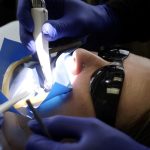
The Art and Science of Dental Tools
December 24, 2023
The Importance of Precision in Dental Surgery
February 22, 2025Introduction
Pediatric dentistry is a specialized branch of dentistry that focuses on the oral health of infants, children, and adolescents. It is crucial for parents to understand the importance of early dental care and the unique considerations involved in treating young patients. In this article, we will explore the practices and principles of pediatric dentistry, including the significance of early dental visits, the range of services provided, and the techniques used to ensure a positive dental experience for children.
Importance of Early Dental Care
The role of pediatric dentists in promoting oral health
Pediatric dentists play a vital role in promoting oral health from a young age. They are trained to address the specific needs of children and provide specialized care that focuses on prevention, education, and treatment. By establishing a dental home for children, pediatric dentists ensure that oral health is prioritized and that any potential issues are identified and addressed early on.
The significance of early dental visits
Early dental visits are crucial for several reasons. Firstly, they allow pediatric dentists to monitor the growth and development of the child’s teeth and jaws. This enables them to identify any potential issues, such as tooth decay or misalignment, and intervene promptly. Secondly, early dental visits help familiarize children with the dental environment and build a positive relationship with the dentist, reducing the likelihood of dental anxiety in the future. Lastly, these visits provide an opportunity for parents to receive guidance on oral hygiene practices, nutrition, and habits that can impact their child’s oral health.
Range of Services in Pediatric Dentistry
Preventive care and oral health education
Preventive care is a cornerstone of pediatric dentistry. Pediatric dentists focus on teaching children and parents about proper oral hygiene practices, including brushing, flossing, and a balanced diet. They also provide guidance on the use of fluoride and the prevention of dental caries. Regular dental check-ups allow for the early detection and treatment of dental issues before they escalate.
Treatment of dental conditions and diseases
Pediatric dentists are equipped to diagnose and treat a range of dental conditions and diseases that affect children. This includes dental caries (cavities), tooth decay, gum disease, and developmental abnormalities. Pediatric dentists may perform procedures such as fillings, extractions, and root canals, tailored specifically to the needs of young patients.
Orthodontic assessment and intervention
Orthodontic assessment is an essential part of pediatric dentistry. Pediatric dentists evaluate the alignment and positioning of the teeth and jaws to identify any issues that may require orthodontic intervention. This could include early orthodontic treatment, such as the use of braces or other appliances, to guide proper dental alignment and prevent more severe issues as the child grows.
Management of dental emergencies and trauma
Pediatric dentists are trained to handle dental emergencies and trauma that may occur due to accidents or injuries. They can provide immediate care for dental fractures, dislodged teeth, and other dental emergencies, ensuring the best possible outcome and minimizing long-term complications.
Behavior management techniques for nervous or anxious children
Pediatric dentists employ various behavior management techniques to create a comfortable and positive dental experience for children, especially those who may be nervous or anxious. These techniques may include distraction techniques, such as using toys or videos, as well as the use of nitrous oxide (laughing gas) or conscious sedation to help relax the child during procedures. Pediatric dentists are highly skilled in communicating and engaging with children to alleviate fear and anxiety.
Techniques for a Positive Dental Experience
Child-friendly office environment
Pediatric dental offices are designed to create a welcoming and child-friendly environment. This includes colorful and engaging waiting areas, play areas, and treatment rooms that are equipped with child-sized dental chairs and age-appropriate dental tools. The goal is to create a comfortable and non-threatening atmosphere, allowing children to feel at ease during their dental visits.
Communication and behavior management
Pediatric dentists are trained in effective communication techniques to establish rapport and trust with young patients. They use age-appropriate language and explanations to help children understand dental procedures and alleviate any fears or concerns. Additionally, behavior management techniques, such as positive reinforcement and praise, are used to encourage cooperative behavior during dental treatments.
Nitrous oxide and conscious sedation
In certain cases, pediatric dentists may utilize nitrous oxide or conscious sedation to help children relax during dental procedures. Nitrous oxide, commonly known as laughing gas, is a safe and effective sedative that is inhaled through a mask. Conscious sedation involves the use of oral medications to help children remain calm and comfortable during dental treatment. These techniques are carefully administered and monitored by trained professionals to ensure the safety and well-being of the child.
Parental involvement and education
Pediatric dentists understand the importance of parental involvement in a child’s oral health. They actively engage parents in the dental visit process, providing education on proper oral hygiene practices, nutrition, and habits that canimpact a child’s oral health. They also address any concerns or questions parents may have, empowering them to play an active role in maintaining their child’s oral health at home.
Positive reinforcement and rewards
Pediatric dentists often use positive reinforcement and rewards to motivate children and create a positive association with dental visits. This may include verbal praise, stickers, or small prizes to acknowledge and reward good behavior. These strategies help children feel proud and accomplished, building their confidence, and making future dental visits more enjoyable.
Conclusion
Pediatric dentistry is a specialized field that focuses on providing comprehensive and age-appropriate dental care for infants, children, and adolescents. By emphasizing the importance of early dental visits, pediatric dentists lay the foundation for a lifetime of good oral health. Through a range of services and techniques, they ensure that children receive the necessary preventive and treatment care in a positive and comfortable environment. By prioritizing pediatric dentistry, parents can help their children develop healthy oral habits and maintain optimal oral health throughout their lives.

